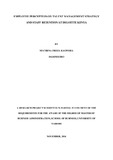| dc.description.abstract | In challenging times, organizations are under tremendous pressure to contain costs, at the same time, they must manage rapid change as globalized markets react so quickly and they must continue driving towards long-term business goals. Organizations that invest in talent management of their employees are unlikely to lose them to competitors. The objective of the study was to find out the employee perceptions on talent management strategy and staff retention at Deloitte Kenya. This study has adopted the form of a descriptive survey design. The population that was targeted for the study was the 400 employees that work in Deloitte Kenya offices. Therefore the sample size was 80 employees who were at the offices of Deloitte Kenya, who were selected using stratified random sampling which was done using R software. The study made use of primary data that was collected through the use of a questionnaire. Descriptive statistics which include mean and frequencies have been used for the purpose of performing data analysis. The mean scores have been used to rate the factors in order of their importance. After data collection which was carried out through the use of questionnaires, this data was prepared for purposes of analysis by having it edited, sorting out any blank responses that were noted, coding these responses, categorizing it as well as keying it into the statistical package for social sciences (SPSS) software so as to be able to analyse it. Conclusions including generalizations regarding the population were inferred from the analysis derived from SPSS emanating from the frequencies produced in the analysis as well as inferential and descriptive statistics. The descriptive statistics used in supporting these conclusions related to mean scores, frequencies as well as standard deviation. With regards to inferential statistics, these were correlation analysis and regression. From the findings above the study surmised that remuneration, organizational culture, reward and recognition, training and career development would be inferred to represent a significant and positive relationship that impacts on staff retention. From the findings of this case study, the recommendation is that both benefits and salaries of employees should be commensurate according to the efforts. In addition the bonus pay to employees should be structured in a manner to motivate employees. This will help in improving employee retention. | en_US |



